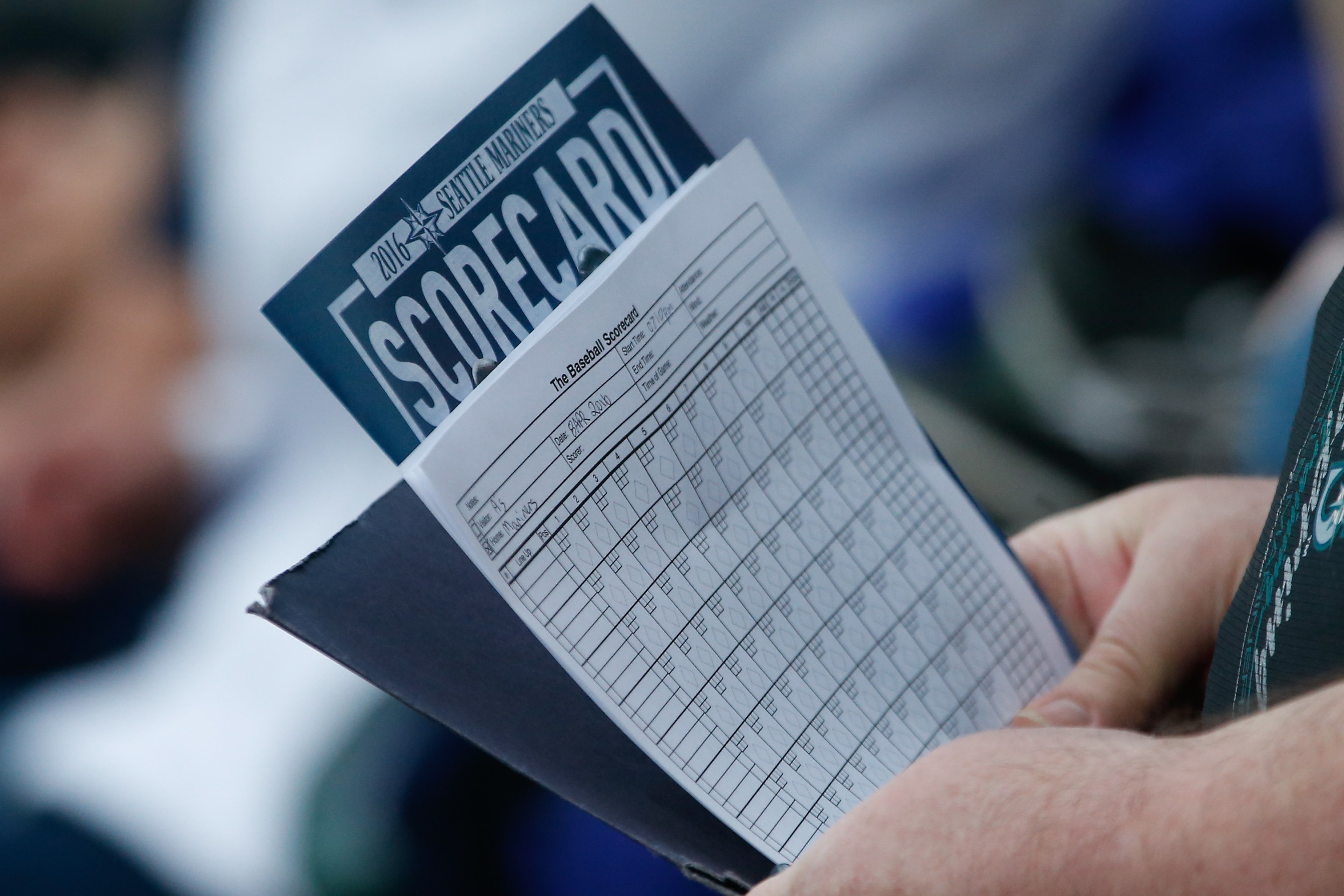Here's a play from last night's Mariners-A's game. It's mildly controversial in a way that's specific to baseball. In the bottom of the third with two outs, Chad Pinder smoked a curveball high in the zone right back up the middle, where it arrived at the glove of second baseman Adam Frazier on one hop. Frazier, however, couldn't corral the ball, instead just knocking it down on the edge of the infield. By the time he picked it up and threw over to first, Pinder was easily safe.
That seems like an error on Frazier, right? That ball does come in hot, but handling something like that is pretty clearly part of the basic duties of an infielder. According to A's color man Dallas Braden, "That's about as routine as it gets." But he was overruled by the official scorer. That play is forever immortalized as a single in the box score—the only hit Pinder achieved in Oakland's eventual 8-2 loss.
These kinds of judgment calls happen all the time in baseball. A fielder is forced into a bit of a tough situation, a runner reaches base, and different observers can have different calls on whether or not it's the guy with the glove's fault. Here's one from Yankees–Blue Jays a few days ago, where a poor throw by Isiah Kiner-Falefa at short gave Gabriel Moreno an official RBI single.
IKF can’t make this play and the Jays make it 10-3, although he’s interestingly not charged with an error pic.twitter.com/NLGTEMEr9p
— Talkin' Yanks (@TalkinYanks) June 18, 2022
It's not just home cooking. One recent scorer's decision that got a lot of scrutiny was this hit ruling on a Max Stassi chopper back to the mound while Mariners pitcher Robbie Ray had a no-hitter going in the seventh. Ray gracelessly, instinctively taps the ball with the top of his glove as it flies past him, interfering with—oh hi, you again!—Adam Frazier's ability to make the out. This was a hit, even though a lot of folks didn't want it to be.
Robbie Ray's no-hitter ended on this play 🫤
— FOX Sports: MLB (@MLBONFOX) June 18, 2022
(via @Sportsnet)pic.twitter.com/TxW32t25Zn
On the flip side, a play that I thought was too harshly deemed an error came at the start of a wild Marlins-Phillies ninth inning last week, when third baseman Alec Bohm seemed to save a possible double but couldn't get the ball across the diamond in time for the out. Pretty unfair, I should say!
This kind of inconsistency is why the savvy baseball fan no longer judges fielders based on how many errors they do or do not make. But the official scorers' decisions nevertheless remain hugely important to telling the story of a baseball game. A team's errors is still one of three key stats seen in every line score, on par with runs and hits. The choice of error or hit also factors directly into a pitcher's ERA—still the first number most people use to evaluate a hurler's season. And like it or not, a fielder's error tally, or how many games they've gone without one, is still a much more easily digestible and widely understood way to explain their effectiveness than Outs Above Average or Ultimate Zone Rating.
I don't take issue with this in itself. Official scorers are a necessary part of baseball's record keeping, and until they allow for half-hits or half-errors, part of that scorer's job will entail picking one or the other on close plays. They're allowed to change their mind within 24 hours, and teams have the option to appeal, but I'm not advocating that we overcomplicate the production of the box score with committees or public hearings or, like, duels at Bladensburg. It's all fine how it is.
Where I do take issue, however, is the role that official scorers play in the hobby of scoring ballgames as a fan. I used to score pretty much every game I went to when I was a little younger, and while I've lost the habit in recent years, the community of scorers is still near and dear to my heart. I work with them, I go to games with them, I'll even help keep track for them when the siren song of a pretzel with mustard becomes too much to resist. And my favorite thing about them, easily, is that even when everyone watches and scores the same game, there's a kind of unique personality present on each card. You can see it in the many videos where team announcers explain their systems: Some scorecards are impeccably neat and easy to read, some are crowded with small innovations that try to squeeze in as much information as possible, and some (like mine) can't help but look a bit improvised. You can tell a lot about a person—in addition to the fact that they're a nerd—by looking at how they score a baseball game, and in that way each scorecard is like a fingerprint, or a work of art.
There's a kind of uniformity enforced on the scorecard, however, by the official scorer. When a play like that Frazier non-error happens, proper scorecard etiquette dictates that you wait for the big cheese's ruling before marking anything down yourself. At the ballpark, they'll often flash "E6" or "single" on the video board, while on the broadcasts, announcers are usually quick to make a "for those of you scoring at home" clarification.
I find this to be a very unnecessary burden imposed on the outsider scorer. I am not MLB. My scorecard is not destined for baseball-reference.com. It is mine, and the game I'm scoring is the game as I saw it. Why should I, on my own scorecard, feel beholden to wait for someone else's interpretation of events? If I see something as an error, I should mark it as an error. If I think it was a hit, then, gosh darnit, it's a hit! I have no obligation to honor the official scoring. If I wanted that, I could print a box score off MLB.com when the game is done.
I know it might go against the kind of authoritative organization that draws some fans to scoring games, but you should think for yourself on these plays. The official scorer is not better than you, and their word is not your law. The ghost of Henry Chadwick will not haunt you as you live out the rest of your days if you mark that "single" as an error on the shortstop, if you believe the shortstop should have made that play. So go ahead and do it! Baseball needs more free spirits like you.





